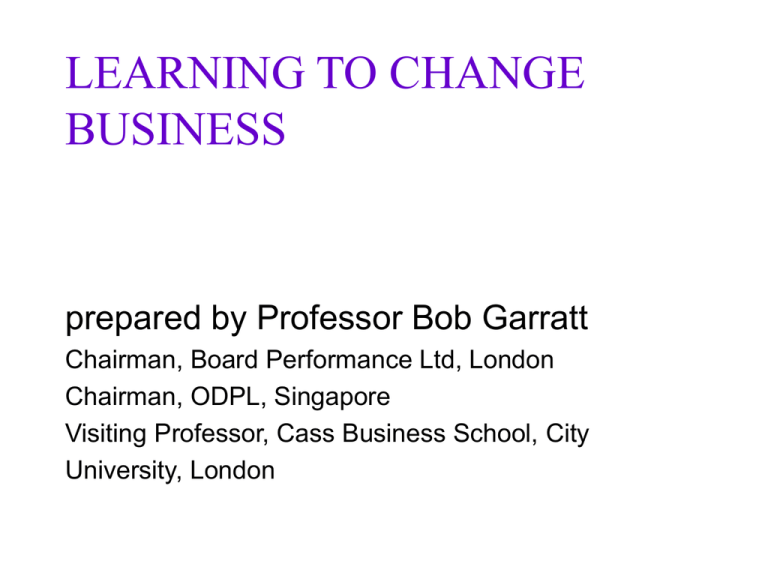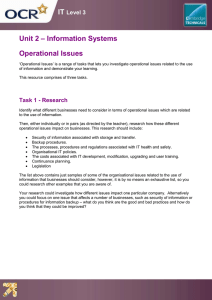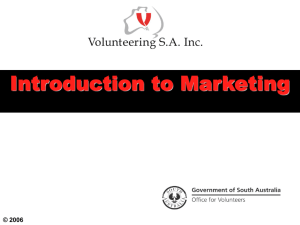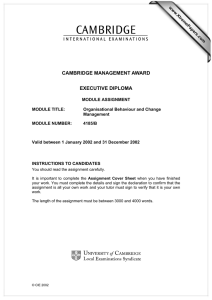LEARNING TO CHANGE BUSINESS prepared by Professor Bob Garratt
advertisement

LEARNING TO CHANGE BUSINESS prepared by Professor Bob Garratt Chairman, Board Performance Ltd, London Chairman, ODPL, Singapore Visiting Professor, Cass Business School, City University, London Some Definitions: 1 • CHANGE from the Anglo French chaunge - the movement from one state or condition to another by itself it has no moral dimension • GOVERNANCE from the Greek kubernetes - the steersman Some definitions: 2 • Learning from the Old English leornung - the self-development of an individual’s attitudes, knowledge and skills • Leadership from the Old English löd - showing the way forward and ensuring followership through a form of consultation • Management from the Old Italian “managgiare” - the breaking of wild horses, C16th; and French menager - the domestic economy of a household, C18th Corporate Governance is a Directoral Dilemma concerns the appropriate board structures, processes and values which drives the enterprise forward to achieve its Purpose whilst keeping it under prudent control The Traditional Organisation "Us" Symbols Pyramidal Hierarchical Many layers Strictly segmented Top-down only Customer unfriendly "Them" Citizens/Customers The Learning Organisation External World The Business Brain Internal World Policy Strategy Operations Acceptance that good and bad learning occurs continuously at all levels of the organisation Focus on systems for capturing learning fast Valuing of people and learning Discussability = forgiveness provided one learns The Learning Organisation Monitoring external environment Giving direction Policy Disruptions from the environment THE BUSINESS BRAIN Strategy Performance Operations Control System Deviations from plans The Learning Organisation Giving direction Policy Organisational Effectiveness Monitoring external environment Disruptions from the environment THE BUSINESS BRAIN Strategy Performance Operations Organisational Efficiency Control System Deviations from plans The Wrong-learning Downward Spiral “Downsize” “Rightsize” Dumbsize and Capsize The Learning Organisation For any organism to survive, its rate of learning has to be equal to, or greater than, the rate of change in its environment L C Source: Reg Revans Primary Tasks for the Board • Formulating Policy/ Foresight • Strategic Thinking • Supervising Management • Exercising Accountability to owners and other stakeholders The Learning Board - Basic Framework EXTERNAL ACCOUNTABILITY BOARD CONFORMANCE INTERNAL POLICY FORMULATION BUSINESS BRAIN BOARD PERFORMANCE SUPERVISING MANAGEMENT STRATEGIC THINKING SHORT TERM LONG TERM C R Garratt 1992 Policy Review Cycle POLICY FORMULATION ACCOUNTABILITY EXTERNAL Stating Purpose Creating Vision and Values Developing Corporate Climate and Culture Monitoring the External Environment To the Company To Owners To Regulators and Legislators To Stakeholders Ensuring Directorial Audits Governance Review Cycle Strategy Review Cycle BUSINESS BRAIN Overseeing Management Performance Monitoring Budgetary Control Reviewing Key Business Results INTERNAL Assessing Organisational Capability Positioning in the changing markets Setting Corporate Direction Reviewing and Deciding Key Resources Deciding Implementation Processes STRATEGIC THINKING SUPERVISING MANAGEMENT SHORT TERM Operations Review Cycle LONG TERM Creating Strategic Changes The Board Ensures That • • • • • • The organisational purpose is clear The organisational vision is understood and accepted The organisational values are understood and accepted Their words are in line with the values and behaviours Their business, funding, and people strategies are clear Project management systems are in place to give continuous quantitative and qualitative feedback on progress • The emotional climate allows for learning and critical review Organisational Capability Survey Internal Focus Task Focus External Focus Clarity of Personal Responsibility Work Quality Organisational Clarity Competitor Orientation Financial Rewards Leadership Learning Climate Process Focus Personal Rewards Organisational Adaptiveness Personal Performance Customer Orientation Group Performance The Learning Organisation Four characteristics: It encourages people at all levels of the organisation to learn regularly and rigorously from their work It has systems for capturing the learning and to move it to where it is needed It values its learning It is able to continuously transform itself The “Good Learning” Organisation: the idealised process of critical review and learning A Mistake or Deviation is made Accept Ownership quickly and assess Possible Risks Are they potentially serious? NO Take Corrective Action and Inform those affected YES Share your discovery to improve work processes and learning Tell someone responsible immediately YES Investigate critically why the mistakes happened Co-operate actively to ensure error is corrected Is there a flaw in the system or process? NO Codify problem and Resolution so that others may learn quickly Problem Solved The ‘bad-learning’ organisation A mistake is made Will it show? NO YES YES Can you hide it? NO Can you blame: - others - special circumstances - a customer YES NO Will an admission of guilt damage your employment prospects? Hide it and hope no-one finds out Problem Avoided Conceal it before anyone finds out NO Be first to your boss with your version of events YES Sit tight and hope the problem goes away Asking Discerning Questions Directors are charged to think critically and independently; and to ask discerning questions of proposals to them using their “intelligent naivety” of the daily operations Breaking The Existing Mindsets so that: • Departments are seen now not as pyramids but continuous “double loops of learning” • fast decision making leads to fast feedback and project-based learning • authority is devolved • successful individual decisions is rewarded Unblocking Resistance to Change The Stability Group Change announced Acceptance Denial Understanding Fear Grieving Resistance Piloting/Demonstrating Developing Strategic Thinking Three Key Questions to Identify the Coalition of Powers to Implement Change Who Knows? (Information not Speculation) Who Cares? (Emotional Energy) Who Can? (Formal Power for Change) Developing Strategic Thinking Strategic Thinking is the ultimate test of the leader rather than of the expert It is the move from being clever to being wise




